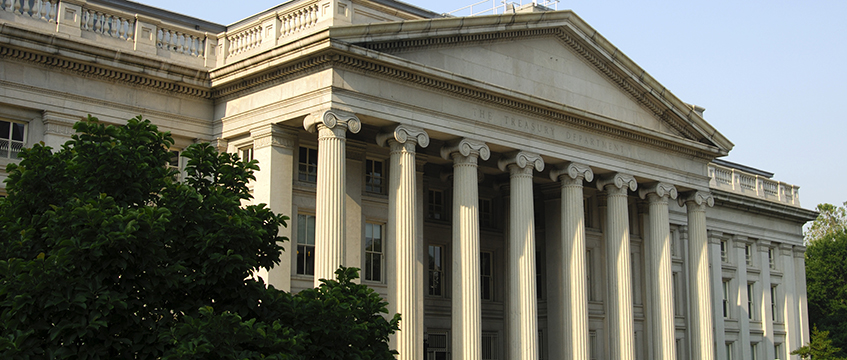A spike in US Treasury yields at the end of last week due to better-than-expected labour market figures spooked the stock market and has enlivened debate around real estate stocks and the relative value of property as an asset class.
Compared to previous sell-offs and corrections, there was little there to drive the scare, fundamentally prompted by a positive report, but the looming spectre of inflation and thus increasing interest rates has driven the turmoil.
REITs have been hit hard and if interest rates rise then the risk premium for investing in real estate is lessened, which in turn may push yields up and pricing down.
The cause
US 10-year Treasury yields spiked at 2.85% last Friday off the back of the January jobs report, which showed the highest wage growth since 2009. This led to speculation about inflation – heavily driven by President Trump’s protectionist policies – and thus a hike in interest rates.
In the UK on Monday, the FTSE 100 saw a decline of 1.5%, the FTSE 350 REITs was down 2.1%, while bond yields rose to 12-month highs.
“US, UK and German 10-year bond yields are at 12-month highs, contributing to the under-performance of listed property stocks YTD at -2.4% for EPRA vs +1.1% for the Stoxx 600,” said JP Morgan’s Property Ticker on Friday.
UK inflation has already peaked, because the pound has already troughed… So the question is where are we going to get this inflation shock from?
For real estate, perhaps more than other sectors, the prospect of rising interest and thus bond rates could be severe. The sector has been the darling of allocators since the financial crisis, due to its high yielding nature, profiting from the volatility of equities and all-time low yields of bonds, which in turn has supported pricing that some have questioned as unsustainable.
Should the spread between property and bonds diminish, many investments will start to look less sensible – especially prime acquisitions in markets such as London and Paris, where sub-4% yields have become the norm.
“A sustained bond sell off with higher yields increasing options for investors, while growth equities outperform is a double negative for listed property,” said JP Morgan on Monday.
Not in the UK and Europe
In the wider macro-economic sense, there is scepticism that an interest rate rise in the US would necessarily lead to an interest rate rise in the UK and Europe, where deflation is more the norm.
“It’s a very good headline grabber to think there is a direct thread through from the US to Europe, if the US sneezes we all catch cold and all that tripe, but the nub of it is the UK is fine,” said Savvas Savouri, partner and chief economist at Toscafund Asset Management,
He said that the fundamentals of bond yields are that they are priced off inflation, and while this is growing in the US, due to President Trump’s economic policies, it is not in the UK or Europe.
“UK inflation has already peaked, because the pound has already troughed… So the question is where are we going to get this inflation shock from?” he said.
“I do not do optimism, I do realism, and economics tells me that a weak dollar is going to send a new wave of disinflation into Europe and the UK against which backdrop interest rates are going to be lower for longer, and that includes gilt yields.”
Not for direct assets
There is also the prevailing view that the performance of underlying direct assets was not a risk.
Part of the global fear has been that inflationist policies – quantitative easing, which has pumped billions into the economy and created artificial bubbles – would cease. This has caused a sale of assets that are not actually performing that well but real estate is not – generally – considered one of these.
Jesse Freitag-Akselrod, senior vice-president of advisory and consulting at Green Street Advisors, said it is better to compare REITs and real estate to corporate bonds or longer term treasuries – rather than the US 10-year – where in both cases the yield spike has been far less significant.
This is important, as he said it implies there is only the current underperformance due to inflation, not the repricing of assets.
He said: “An inflation uptick is not necessarily a bad thing for real estate, as it’s a good hedge against inflation. So if real yields are going out and assets being repriced, that is a bad thing, but if it is only due to inflation expectations, that is not.”
Not necessarily a bad thing
Walter Boettcher, director of research and forecasting at Colliers International, thinks that while there may be some impact on property, it is not likely to be substantial.
“If you buy into the argument that bonds form the benchmark pricing for property, there has to be some form of impact, and I would think UK gilts would rise only because if you are getting 3% on a US gilt, why would you put it into another market with lower returns,” he said.
However he said the sheer weight of capital from ageing populations, alongside the sheer size of the yield gap between property and bonds, will absorb any changes.
He said of more concern at the moment is how retail investors may react to negative accounts of the market.
Globally stock markets have been highly volatile since and there has been an underlying concern that a rise in gilt yields could result in a full crash.
And despite the somewhat positive initial cause, there is an opinion from some that it would lead to a necessary correction in pricing in real estate.
One banker said: “It’s a positive as it has taken some of the steam out of the equities as well as bitcoin market and longer term increasing interest rates means a stronger investment focus on risk adjusted returns.
“If you feel the risk-free rate is rising, then investment decisions should rebalance back to property fundamentals rather than simply saying property shows a premium relative to other also overheated asset classes.”
To send feedback, e-mail alex.peace@egi.co.uk or tweet @egalexpeace or @estatesgazette











